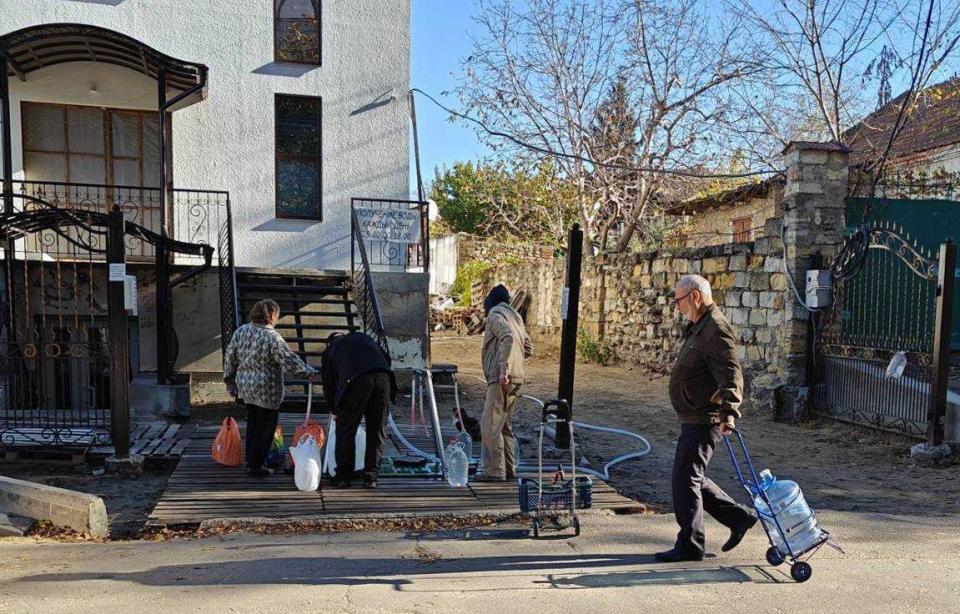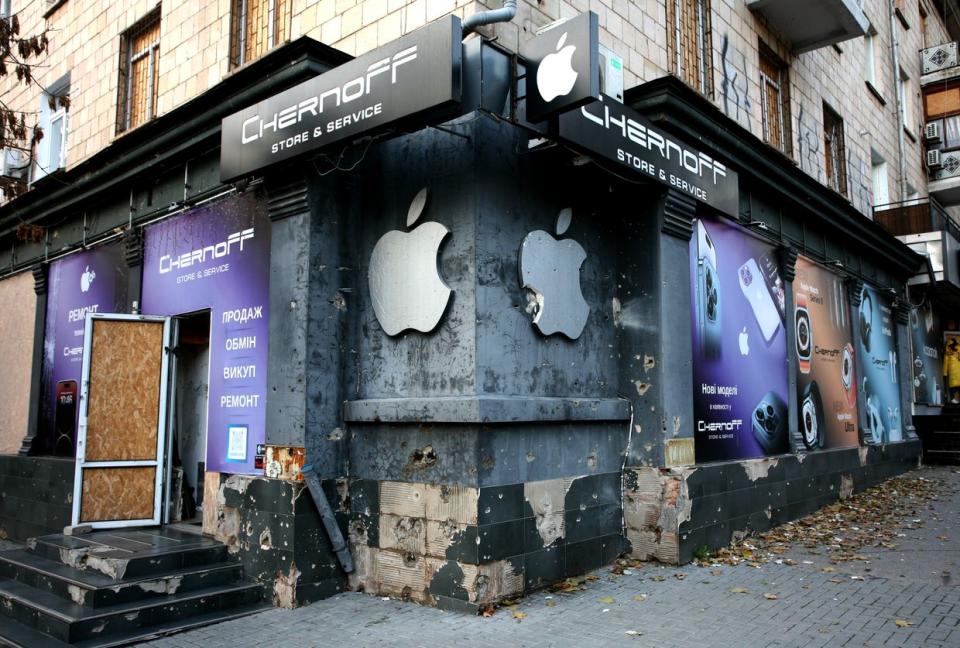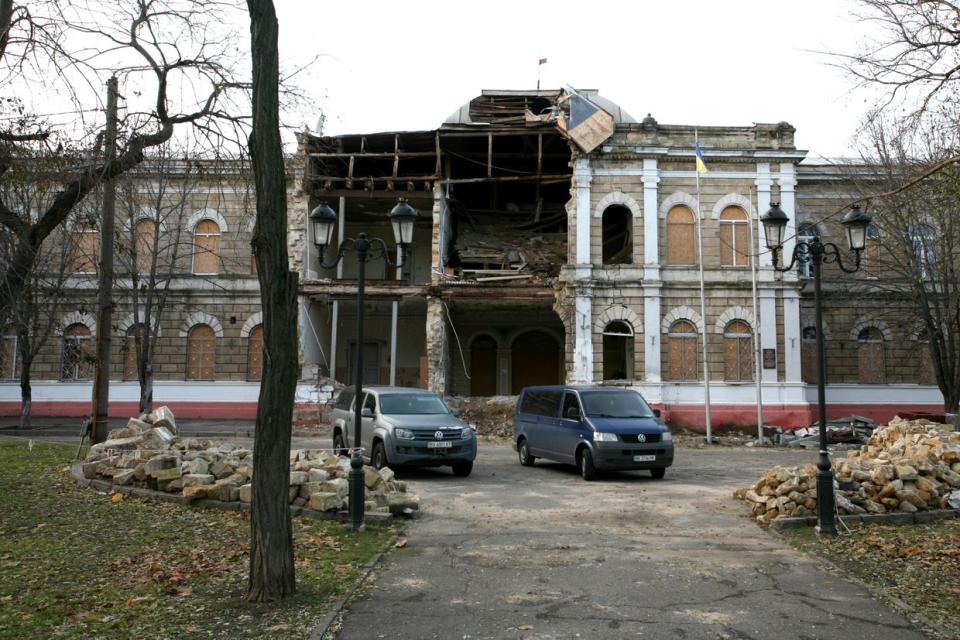‘We can't wait for peace:’ Reluctant at first, Denmark takes on rebuilding war-torn Mykolaiv Oblast
When President Volodymyr Zelensky announced to the Danish Parliament last March that Ukraine wanted the Nordic country to rebuild the war-torn southern Mykolaiv Oblast, it was the first the Danes had heard of it.
Not only was the president’s plan to assign Ukrainian regions to allied countries for reconstruction unorthodox, but Mykolaiv Oblast alone is more than half the size of Denmark, is heavily damaged by the war, and located less than 70 kilometers from the front lines.
Zelensky’s speech to the Danish Parliament on March 29, 2022, came mere hours after Russia launched an attack at the regional Mykolaiv government building, killing 37 people.
Danish Prime Minister Mette Frederiksen initially refused the proposal but changed her mind after witnessing first-hand the devastated landscape in April last year and meeting with the mayor of the city of Mykolaiv, Oleksandr Senkevych.
Copenhagen then ran with the idea, initiating the experimental “Whole of Denmark” approach from a new satellite embassy in the city that opened this October. The project not only addresses Mykolaiv’s urgent needs but also looks towards long-term reconstruction.
“Normally we don't do reconstruction on a regional basis. It would typically be done through multilateral institutions. But it has worked well,” Danish Ambassador to Ukraine Ole Mikkelsen told the Kyiv Independent.
Denmark is now directing 60% of its development aid for Ukraine to Mykolaiv, which is split equally between the city and the oblast and distributed across multiple sectors, from humanitarian demands to critical infrastructure repairs.

The country has become the first nation to provide large-scale investments in local businesses in addition to supplying humanitarian aid in Mykolaiv Oblast. The goal is to rebuild an attractive commercial landscape and foster self-sufficiency, despite the risks of Russia’s indiscriminate aggression, Danish officials say.
Mykolaiv is hemorrhaging money as the war has destroyed some of its local businesses. Shipyards are closed, the port is shuttered by Russia’s Black Sea blockade, and destroyed factories litter the outskirts with owners unable to finance their reconstruction.
Damages to Mykolaiv are estimated at nearly 1 billion euros, Senkevych told the Kyiv Independent.
“We don’t want to be a distant relative that always needs financial help. But a partner that will help to earn money for Denmark, so they can invest even more,” Senkevych said.
On the front lines of the economic war
Although Russian troops have been pushed into neighboring Kherson, the city of Mykolaiv’s proximity to the front lines and active hostilities means that both international and local banks are hesitant to lend money to local businesses.
Under the direction of Denmark’s Export and Investment Fund (EIFO), the Danish government is supplying loans to Ukrainian businesses with a special focus on Mykolaiv. Since its launch in May 2023, EIFO has become the only option for some struggling local companies.
“Russia wants to destroy the foundations of the economy here,” Finance Director of EIFO Kaare Andreasen told the Kyiv Independent.
“That’s why you need export financing because we take risks where normal financing cannot.”
Andreasen sees the region as the heart of the economic war. Once the shipbuilding mecca of Ukraine and home to its second largest port, the war has killed both these industries and forced specialists to leave the city.
Driving through the countryside of liberated eastern Mykolaiv, the overgrown fields are indicative of another hurdle: Russian mines. Mykolaiv’s farmers have taken a major financial hit, forced to watch their crops rot in contaminated fields.
The current process for demining is lengthy. It took three sappers from one NGO nearly nine months just to clear one patch the size of a football field.
The villages and rural towns are deathly quiet in Mykolaiv Oblast. Weeds and wild animals have taken over the scores of bombed-out houses and it is unclear if the previous owners will return.
Faced with such landscapes, it’s easy to understand why Andreasen thinks Russia is currently winning on the economic front. He warns that the West is falling into the same hole as the delayed military aid, and needs to speed up commercial development before it's too late.
“We cannot wait for peace. I think what we've been doing in Mykolaiv is appreciated by our Ukrainian friends because they cannot wait for peace either, especially in the frontline cities,” Ambassador Mikkelsen said.
“We hope that this might inspire other countries to do the same.”
Praising Danish efforts in Mykolaiv, President Zelensky called on other countries to quickly follow suit during a surprise visit to the city on Nov. 29.

Equal terms
Tasked with dispersing 130 million euros in loans, Andreasen has become one of Mykolaiv’s most popular Danes. He is regularly approached by local businesses eager for help from Denmark.
“It’s a big problem for me, do they really love me for my personality or just my money!” he jokes over a cup of coffee in one of the city’s cafes.
But Andreasen’s budget can only cover 21 projects and the full 130 million euros was earmarked within two months. He hopes that more funding will arrive next year, although EIFO was not included in Denmark’s 2024 State Budget.
Both he and local political figures stressed the urgency to increase funds to a Danish delegation that visited Mykolaiv on Nov. 30. Andreasen is hopeful the request for more financing will reach the upper echelons of Copenhagen and the budget will be revised.
Under EIFO's terms, Ukrainian companies must buy at least 30% from Danish companies. Currently, it is much higher, at around 70%.
“We're actually creating jobs in Denmark. And that's also what we try to communicate with the other politicians. In the long run, we are creating a good solid foundation for Danish companies down here,” Andreasen said.
Inside the charred factory of an agricultural company an hour's drive east of the city that was under occupation for nine months, the name of a Danish manufacturer is embossed on machinery pockmarked with bullet holes. Like the majority of EIFO’s projects, the company name is not revealed for security reasons.
The agricultural business told the Kyiv Independent that the same Danish manufacturer will conduct an assessment of the facilities and determine how much of their machinery is salvageable, while EIFO will provide a loan to the Ukrainian company to repair and replace what cannot be saved.
Despite damages amounting to $220 million from the war, the company has managed to rebuild some of the facilities on its own and resume production and export abroad, albeit to only a third of its pre-war countries.
For Andreasen, this is a textbook project for EIFO, even with Russian positions just 35 kilometers away. Companies need to be deemed profitable to limit the risks for foreign partners as the Danish manufacturers will only receive payment once the machinery has been installed and operating.


Boots on the ground
Faced with 400 million euros in damages, agricultural giant Nibulon began scouting for funding. Operations had fallen to 32% with its cargo ships blocked in the Mykolaiv port by Russia’s blockade and 30% of its fields contaminated with mines.
CEO Andriy Vadaturskyy initially attempted to garner funding through the European Bank for Reconstruction and Development (EBRD). But he found the process bogged down with bureaucracy and was frustrated that the EBRD had closed its offices in Ukraine, meaning that meetings would have to be in London.
But with EIFO, communication was quick, easy, and in person, he said. Even after their initial project failed after a grain silo in neighboring Odesa Oblast was hit by Russian missiles, EIFO and Nibulon managed to restructure the deal within an hour.
They agreed to a credit line of 26.5 million euros to be repaid over 15 years with 8.5% interest — the export agency’s flat rate. The loan was converted to eight other projects instead of the silo.
Part of the funding will be used to purchase agricultural machinery to improve Nibulon’s crops. The company will have two years to get up and running before starting to pay back the loan, which Vadaturskyy says will ease pressure in the short term.
“The Danish government is sending people here. That's the difference. If you want to do something here, you should be here,” Vadaturskyy explained from his exiled office in Kyiv.
“It's very difficult to explain the situation abroad and what kind of conditions and challenges we have.”

Danish companies have also started planting roots in Mykolaiv, with the semblance of a Danish quarter emerging. Bright Bird, a risk management company headquartered in Horsholm, opened their office in September around the corner from the Danish satellite embassy.
“Since Mykolaiv is the epicenter of Danish foreign policy to support Danish investment and Danish businesses entering Ukraine, we figured it would make more sense to be here than in Kyiv,” Head of Risk and Intelligence Rasmus Ruhfeld explained.
Although it's still early days, the company says there is real potential in Mykolaiv and believes they can contribute to the reconstruction process by connecting Danish and Ukrainian companies.
The main challenge at the moment is convincing European clients that everyday life away from the front line is in stark contrast to the images of war and bloodshed depicted in the media.
“European businesses are hesitant to engage with Ukrainian business. They’re afraid of new facilities getting bombed. But you don’t have to be physically here, a business can start just by collaboration,” CEO Thomas Trust Have said.
The arrival of Bright Bird imbues optimism in Mayor Senkevych. He notes that the company will be able to guide international businesses interested in operating in Ukraine and Mykolaiv, instead of overburdening the local administration.
One area that is likely to be developed in the future, according to Vadaturskyy, is Mykolaiv’s shipbuilding industry. While Denmark has mostly moved construction of vessels to countries like China, it hosts companies specializing in shipping design and technology which could potentially cooperate with Mykolaiv’s shipyards to usher in a new golden age of shipbuilding in the region.
“We have welders, we have people and we have access to the sea,” he said.


Societal growth
To achieve these goals Mykolaiv needs to attract citizens back and offer opportunities both in terms of jobs and in quality of life. Andreasen points to the restoration of educational facilities, including the Admiral Makarov National University of Shipbuilding which was hit by a Russian missile last year, as an important step.
To alleviate the suffocating fog of war, the Danes also organized cultural events such as a film festival and even a bike ride which saw 500 participants. Cycling, which is built into Denmark’s DNA, is something the Danish envoy is keen to impart to their adopted city.

Senkevych is also addressing transparency concerns, which in turn will encourage foreign businesses wary of Ukraine’s reputation. His efforts have so far been noted, with private European companies highlighting to the Kyiv Independent that Mykolaiv is an appealing place for business.
So far, Bright Bird says it has not faced any issues with corruption. Meanwhile, EIFO has made it clear that it will not deal with crooked businesses, cutting off two projects over suspected corruption cases.
“We are ready to do everything to change our processes, to change our politics, just to grow and to make it more honest,” Senkevych stressed.
“We need to build a city where people will be able to earn money, to buy affordable and good quality housing, and to develop themselves. We need to do this to bring people back."


Subscribe to the Newsletter
Ukraine Business Roundup
We’ve been working hard to bring you independent, locally-sourced news from Ukraine. Consider supporting the Kyiv Independent.

